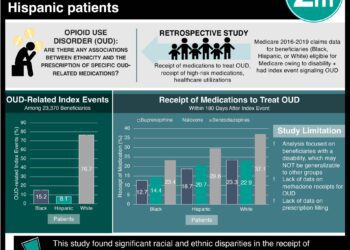Infant race and ethnicity are commonly misclassified in research studies
1. In this systematic review, discordance in infant race and ethnicity data was found to be commonplace across various data collection methods, including birth certificates, death certificates, self-reports, and algorithmic strategies.
2. Discordant race and ethnicity reporting across measures was more common among infants of color and for infants born to interracial couples. These errors lead to underestimates of health disparities in perinatal outcomes.
Evidence Rating Level: 2 (Good)
Study Rundown: Accurate race and ethnicity data are essential for understanding and addressing health inequities. Obtaining such data is particularly challenging for infants, who cannot provide a self-report of their identities. This systematic review of 12 articles written between 1980 and 2021 synthesized evidence of the discordance in race and ethnicity as recorded on birth certificates, death certificates, parent reports, and via multiple computer algorithms. Estimates of misclassification across studies ranged from 1% to 40%, with the lowest rates occurring among white infants born to two white parents, and the highest rates occurring among infants of color and infants born into interracial families. All algorithms used to estimate race and ethnicity from raw data resulted in some loss of accuracy. The reviewed studies also provided consistent evidence that race and ethnicity misclassification led to an underestimation of health inequities in perinatal outcomes. This systematic review benefits from searching for articles across multiple databases, which allowed them to compile evidence that spanned 46 years of US births, including over 116 million infants. However, it was limited by drawing from a relatively small pool of evidence, much of which was more than two decades old. It provided strong evidence that race and ethnicity misclassification occurs commonly for infants and that these errors result in an underestimation of health inequities, but no information on how to correct for such biases.
Click to read the study in Pediatrics
Click to read an accompanying editorial in Pediatrics
Relevant Reading: The implications of racial misclassification by observers
Image: PD
©2022 2 Minute Medicine, Inc. All rights reserved. No works may be reproduced without expressed written consent from 2 Minute Medicine, Inc. Inquire about licensing here. No article should be construed as medical advice and is not intended as such by the authors or by 2 Minute Medicine, Inc.







